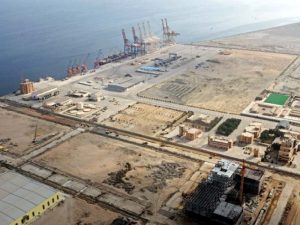To extend CPEC, billions are required.
The agenda of the PM’s visit to China also includes new investments and debt restructuring.

As it prepares to make a new case for the expansion of the China-Pakistan Economic Corridor (CPEC) during Prime Minister Shehbaz Sharif’s visit, Pakistan may ask China for a multibillion-dollar financing window to build 10,000 megawatts of solar-powered electricity-producing projects.
To examine and finalize the itinerary for his first visit to Beijing, which is scheduled for November 1st, Prime Minister Shehbaz Sharif presided over a meeting on Wednesday. Pakistan has a large list of initiatives, including brand-new plans worth billions of dollars, which it wants China to fund. A trilateral deal between China, Pakistan, and Saudi Arabia to build an oil refinery in Gwadar is one of these.
The government intends to build 10,000 MW worth of solar power facilities, which are expected to cost $5 billion. According to a representative of the energy ministry, “we are eager to secure up to $2 billion in Chinese funding and will pitch a generalized framework agreement for signing during the PM’s visit.”
The outcome of the scheduled international competitive bidding for the plants and the Joint Cooperation Committee’s (JCC) approval at the CPEC conference will determine the request for Chinese financing for the solar power plants. Officials have also provisionally scheduled the JCC’s 11th session for October 27.
According to a senior official from the energy ministry, PM Sharif will only discuss the matter if the Chinese companies are successful in their bids for the solar power projects before he departs for Beijing in the first week of November. Pakistan wants China to provide a credit line so that Chinese businesses can finance solar project investments.
The PM’s visit has also been suggested for the signing of the trilateral cooperation agreement to build an oil refinery and petrochemical complex in Gwadar. Officials with access to these negotiations claim that Saudi Aramco has expressed interest in awarding the refinery deal contracts to Chinese firms.
Separately, China’s East Sea Group has also volunteered to invest $3.6 billion in building a five million-tonne oil refinery in Gwadar’s Free Zone. According to the officials, this development might also be on the table for more conversations during the PM’s visit.
The two main obstacles in the path of additional Chinese investment are the non-payment of dues by the Chinese Independent Power Plants (IPP), which total roughly Rs240 billion, and the opening of a special bank account to prevent them incurring circling debt in the future.
In an effort to alleviate the bottleneck, the Economic Coordination Committee of the cabinet is anticipated to sanction a bank account for CPEC with roughly Rs100 billion before the PM’s visit.
Ahsan Iqbal, the planning minister, stated that Pakistan wanted to resurrect CPEC and also start up new projects. CPEC remains in cold storage throughout the PTI administration.
If the unresolved problems in the electricity sector are overcome, Pakistan will ask China for assistance in accelerating the $2.5 billion Kohala hydropower project and the $1.6 billion Azad Patan hydropower project. It will also be possible to complete the $3 billion, 1,320 MW Thar Block-I project financially.
A proposal for Chinese funding of the Advanced Metering Infrastructure project is also on the table as Pakistan looks to invest $1.25 billion to address the problem of high distribution losses and low bill recovery.
A new transmission line between Hub and Gwadar will also need to be funded by China in order to maintain supplies. However, the government is eager to switch the 300MW Gwadar power plant to nearby Thar coal at the same time.
In order to perform feasibility studies for the construction of the Babusar Top tunnel and the restoration of the Karachi-Hyderabad Motorway, the government has also talked about signing two Memorandums of Understanding. For the JCC and PM’s visit, funding proposals for the Mansehra-Muzaffarabad Road project and the Sagu-Zhob Road project have also been put out.
Pakistan is also thinking about recommending the signing of a framework agreement for the development of the Karakoram Highway’s Thakot-Raikot section.
Syed Murad Ali Shah, the chief minister of Sindh, opposed to the proposal from the Ministry of Industries to establish a Special Economic Zone on the property of Pakistan Steel Mills (PSM), claiming that his province had not been taken into consideration. Since the government also aims to sign a government-to-government framework agreement to establish the necessary SEZ on the PSM’s property during the visit, PM Sharif instructed the planning minister to involve the province.
It is envisaged that Pakistan and China will sign a framework strategic cooperation agreement on semiconductor manufacturing in the IT sector.
Pakistan will also seek new loans and a restructuring of its debt during the PM’s visit, though the administration has not yet finalized the package. The PM’s agenda includes gaining greater market access for Pakistani goods, according to representatives of the Ministry of Commerce.




















































